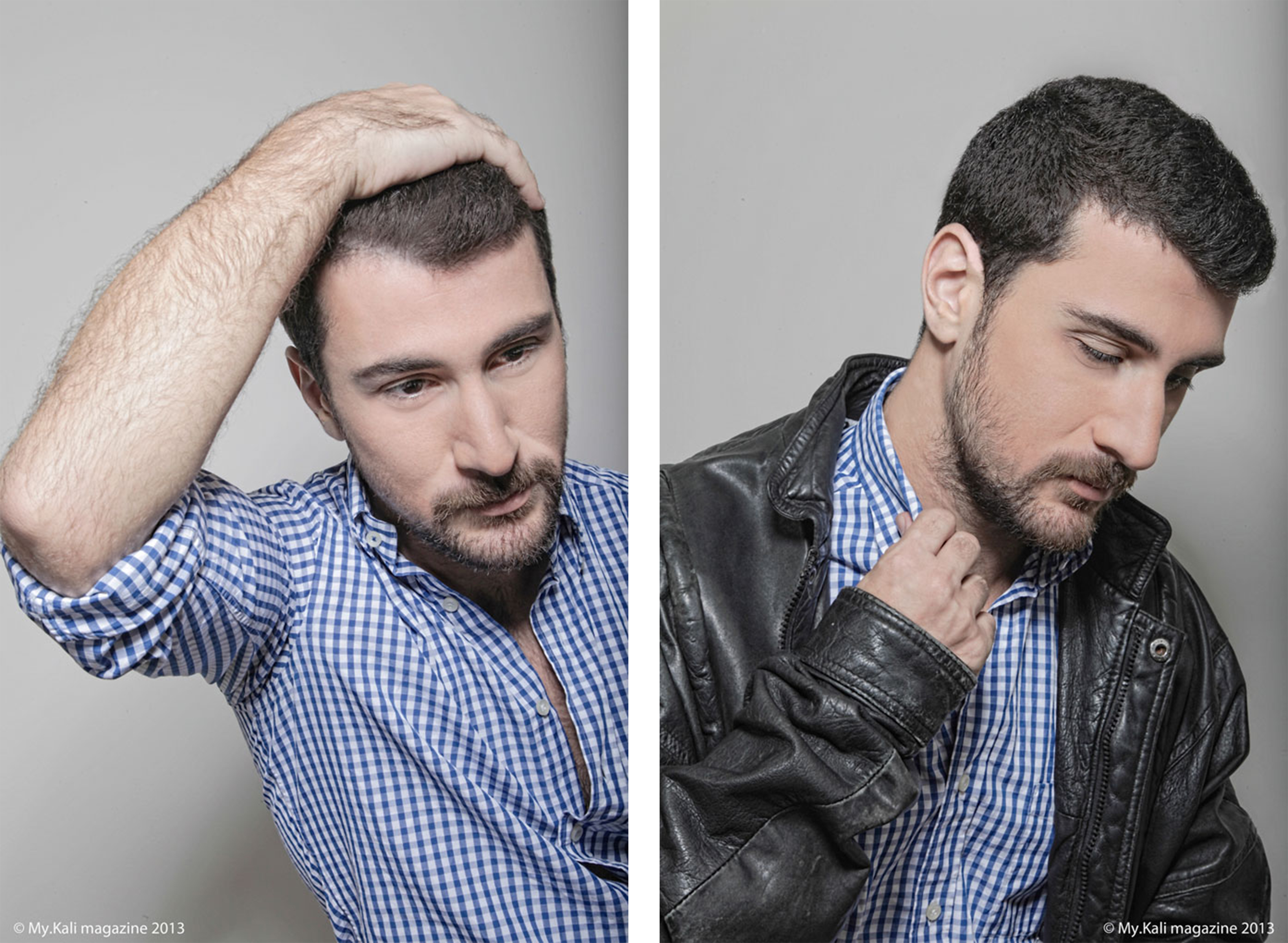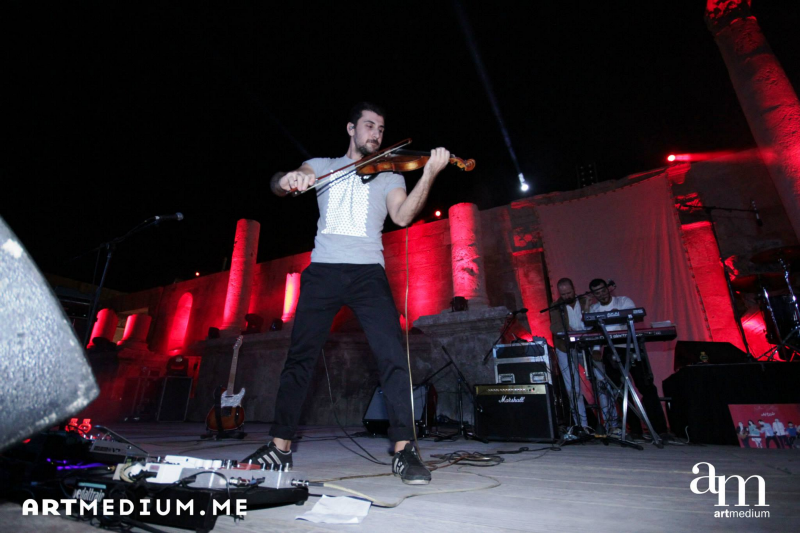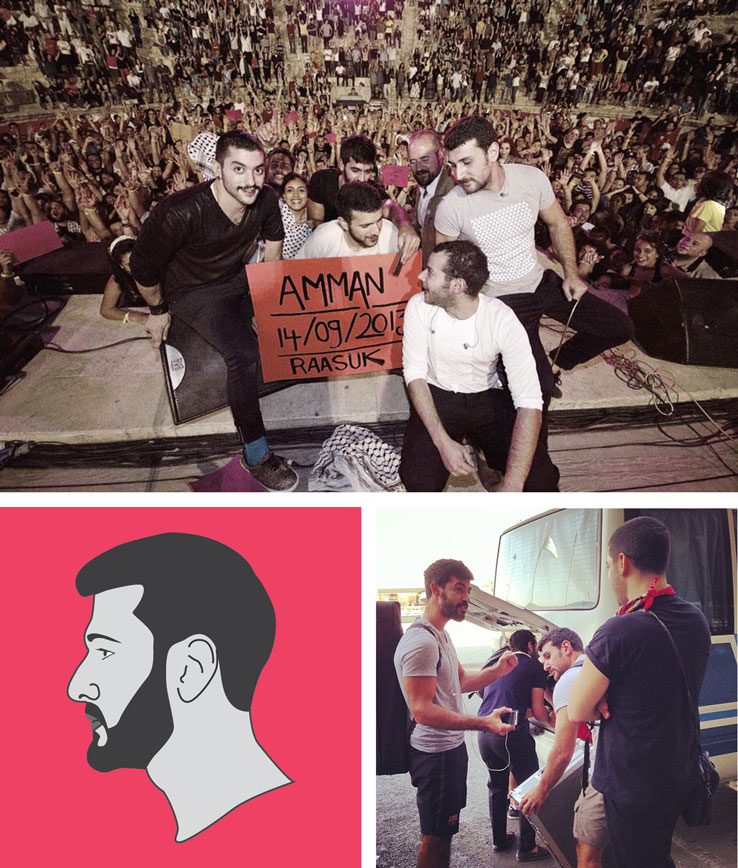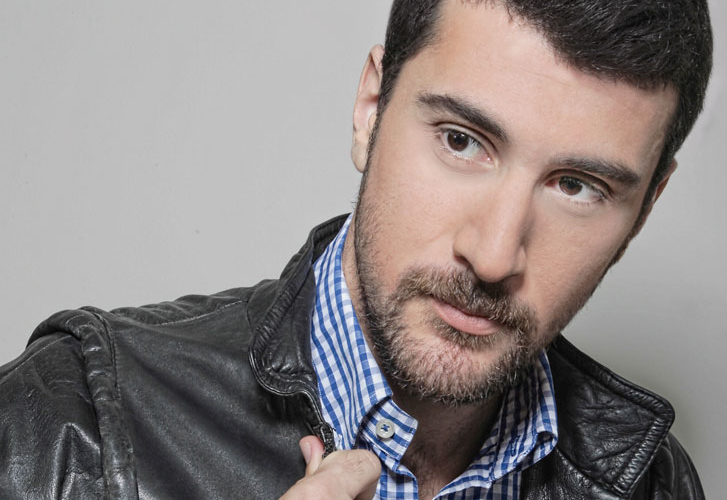My.Kali meets the architect of Mashrou’ Leila’s distinctive sound
Photographed by Hiba Judeh
Make-up by Amer Atta
Interview by Mike V. Derderian
The golden stage curtain shimmers in the background. The belly dancer’s dress has similar hues and texture, yet she stands out with every movement and facial expression. The magenta tone gives her swaying body a mesmerizing allure. You can’t take your eyes off her: Hamed Sinno, the lead vocalist of Mashrou’ Leila, can be heard more than seen.
A few minutes into the video Lil Watan you catch a glimpse of Leila’s lead violinist in this giddy performance, as he approvingly waves his bow at the dancing seductress. When I interviewed Haig Papazian not long after the filming of the video, his publicist asked if 10 minutes was enough for an interview, and I said yes. I lied. I had a lot of questions and I had every intention to ask them all.
Who are you in your own words? Who is Haig Papazian?
A lot of people know me as the violinist-and-musician part of Mashrou’ Leila. All of us in the band have a lot of side projects as well.
I’ve been playing music since I was a kid. I studied violin. I went to this Armenian music school. One of the reasons we started Mashrou’ Leila was that we did not want to quit music because we were studying architecture. We all have our careers in architecture, design and engineering, and we’ve been working on them.
A lot of our work and input in Mashrou’ Leila comes from our backgrounds. Our other projects affect us and affect our music. Everything is connected. It comes hand in hand. I’ve been working in architecture and research for the past five years, however, I also been focusing on artistic work like conceptual art and contemporary art in videos, installations and illustrations.Everything comes hand in hand. My artistic and architectural work affects a lot how I perceive music and the spatial part, and the image of Mashrou’ Leila.
What other roles in Mashrou’ Leila do you have in addition to being the violinist?
We all write music together. On stage and at this point I play the violin, percussions and other instruments depending on the setting and the setup. When we are writing the music we all compose together.
We do almost everything but somehow, ever since we started Mashrou’ Leila, I was in charge of our social media. We were able to use social media to our advantage. There was a certain boom happening back then in 2008. We were just writing music and putting it online and people were reacting to it. It started to create an image of what Mashrou’ Leila is and what it represents.
It all evolved from the letters we used to send to the fan page about this girl, Leila. Who is Leila? Who is writing the messages; inviting people to dance with her; talking about her sister; talking about revolutions; talking about music; and who is talking about her lovers? It was all part of the identity. In the beginning it wasn’t thought of or planned. It was driven by the reaction of the people until we started working on it.
You also edited and directed El Hal Romancy video. Tell me more about that experience.
The whole process of writing El Hal Romancy is that we did everything from A to Z. We recorded everything ourselves. We have set up our own studio. We did the album art. We worked with this amazing photographer, George Audeh, and did photos for the album.
Hamed designed everything. We did the same when we were doing this huge mega concert in Beirut. We designed the stage and the lighting. Everything was a bit rushed. At some point we really wanted to do a music video.
All the while I’ve been doing short videos and we decided that we needed a music video to represent the maturity that was happening with the band. People had this very cute idea about who the band is and what they represented so we wanted to push that in a way that the band members are not in view. It is a completely different person. It is somehow introspective but at the same time she, the girl in the video, is in this city.
It was a no budget project. We had a very tight schedule. We had a day and a half but the main actress backed out so we had to find a different person.

Haig is wearing a white and blue checked shirt from Massimo Dutti, a second-hand leather jacket from Amman’s most famed flea-mareket, Abdali
There was a lot of running around!
Yes. Editing was very quick even though things did not go as planned.
What does El Hal Romancy imply? Is it about finding hope in a higher place or suicide as a solution?
That is the thing. The video was supposed to have a different ending. We had to come up with an alternative ending. For me it is not a suicidal thing! She is actually looking up and trying to know what will happen next in an unknown future; an open ending. It is a song about our current interpretation of what love is and how it affects us, especially in the region, and how we see ourselves in the future.
The region is getting fucked up! Lebanon’s political arena, as in other Arab countries, is quite fucked up.
Everywhere else is very fucked up as well.
When you look at that through your music do you say fuck that shit, we are the voice of our generation now? Where do you see yourselves as a band?
It is affecting everything. We are not separate from what is happening, especially from the things happening in Egypt, Tunisia and Syria; the things happening in Palestine, Kuwait and Bahrain. We know a lot of people there. Every time we visit we realize the importance of the situation and the effect it is having on everyone.
You cannot distance yourself from this. You have to embrace it. This is how you are able to step back and have a different insight and project yourself. Our music isn’t about what has happened and what is happening, it is more about the possibility of what can happen. It is about narrating stories with open endings.
Like life itself.
Like life itself. You are living the moment now and tomorrow you don’t know what is really going to happen, especially in the constantly changing battle ground in the Middle East.
I have personal projects. The band, Mashrou’ Leila, we cannot say we know where it is exactly going. We all are putting all our effort to make it go somewhere. Sometimes we have a huge show coming up that is followed by a couple of months of inactivity that leaves us a bit down as things aren’t moving as fast as we hope it would. My research and artwork feeds into the band as does the work of others. It happens in the form of exploring different sounds, instruments and techniques. Our music is becoming more and more complicated. The first time we played in Jordan we had very few pedals and guitars. During our last concert we had triggers for the drum, a lot of guitar pedals and we were able to hear ourselves perform through earphones.
We loved playing in Jordan as Art Medium did an amazing job with the setup. Everything was on time, the sound and the lighting. In another country we would have to wait five hours until they bring the drum set; and sometimes you end up with a broken or a bad drum. It is very tough to do music in the Middle East but we are trying to change things. Regarding music I am returning to school next year. My work is related to my Armenian background through representations of masculinity and heroism within the context of the Lebanese Armenian Diaspora in the 70s and 80s. I will delve into the lives of my people’s revolutionaries. It will deal with the issue of what happens to a hero when they have no cause to fight for. This is where my work intersects with Mashrou’ Leila because it talks about this transitional time. You don’t know what is happening right now and you are trying to see what the future will offer.
My work will also question the role of men in society at such times. In the end we all as a band affect each other. We take from each other. I don’t know if listeners realize this but every Mashrou’ Leila song has a context to it and relation to space. In our songs you have a lot of things happening from a very concrete traditional street view to an abstract idea where one can exist through imagination.

We all know being a musician takes a lot of time, dedication and sacrifice. What would you tell anyone who wants to become a musician?
You really have to work very hard. We are not all very great musicians but we’ve been working on ourselves for the last five years. To improve ourselves and our sound we do a lot of musical research. We see and hear what is happening around the world. We listen to a lot of music. We download a lot of software to play with to see what they can offer the band musically, and we try a lot of instruments. What doesn’t fit the band or the sound we are looking for we throw away. It is a trial and error process. Everything happens in a process. It will not just come in one day.
There is a certain evolution that happens from the first album to El Hal Romancy to Raasuk. It becomes different and a lot of people might not like what Raasuk is. These people are still stuck at the first album but we are moving forward and if people want to catch up with us they can either do that or stay with the first album. It really depends on their interest but we are not here to please anyone. We don’t expect people to be pleased by everything we are doing. If we do that we will repeat Fasateen over and over and people will be ‘oh my God they are so cool and we are happy.’ No, that is not how things work.
You’ve crossed a lot of red lines as Mashrou’ Leila. In fact you’ve obliterated these red lines by tackling issues like gender equality, sexuality, liberation, freedom, rebellion against the system and politics. Doesn’t that have a toll on your psyche as humans? In one of your videos one male band member donned a wedding gown! Angst feeds the creative fire but that comes with a price! What do you say about that?
When it comes to music videos we work with different young directors, who have ambitions and ideas of their own that they want to show. They pitch in ideas and we decide if we want to move forward with a particular one. The wedding gown was part of the director’s vision. It really puts it out there. I mean Carl Gerges is a very macho and tough looking guy but at the same time if you put lipstick on his face it creates a ruptured picture of what a man is.
What about the negative comments that Mashrou’ Leila receives? As you said you cannot please everyone.
In the Arab world people are not used to identifying with bands. They identify with figures; a single person. The hate or the love is towards one person. They have this star syndrome but when it is a group of people, and you don’t know who is who in the band, it becomes a little vague. For example, because of Hamed people think that the entire band is a gay band. They send us homophobic e-mails. It is part of the way society tries to simplify things. The lead singer has a particular sexual orientation so the whole band is probably like that. This isn’t necessarily true.
We are completely supportive of what Hamed says. We’ve been supportive to a lot of causes in the past couple few years. This one pops out usually in interviews but I guess that is the Arab world right now. Maybe you need heroes like that to show people that there is something else.
I was going through the comments one your Youtube channel the day you published Lil Watan video. Some liked it and some hated it. Everyone was coming with his/her own explanation to why they thought it was bad. I personally loved the message behind it and how heated patriotic anthems often blind people. Some even went to as far as throwing Hamid’s sexuality in there. Do you ever respond to such e-mails?
No, we don’t bother. The nice thing happening about the Lil Watan video is that there has been a lot of discussion.
It started off with a hate-filled reaction and people saying ‘Oh my God we weren’t expecting this from Mashrou’ Leila! What are they doing.’ Then people started talking.
A debate started. We see it on Facebook and Twitter. I think it is a very healthy discussion. This is also a different representation of our society.
Hopefully one day in the Middle East women will have rights; have the right to give nationalities to their kids; and the right to defend themselves from oppressive men. Right now things are sad especially with what is happening in Syria, Egypt and Tunis, in addition to parts of the gulf area that no one in the media talks about. Maybe the day will come and homosexuals will have a say on how they want to lead their lives.

From clockwise: Mashrou’ Leila in the Raasuk concert in city Amman (Muath Selwadi); the band just arrived in Amman for Raasuk concert (Art Medium); Illustration of Haig for Raasuk cover art (Hamed Sinno)
You are the darlings of the Arabian underground and alternative scene. How do you classify yourselves as a music genre? Can you say your music is alternative?
Alternative to what? Pop music! Yeah maybe but at this point we refer to ourselves as independent Arabic music. All these labels they don’t make sense. We reached a point with internet that does not allow you to know what it is called anymore. Music is always available and you have access to it and people share it.
Is there a country that you really enjoyed performing at?
Jordan and Egypt are crazy experiences. They have masses. People here have this star fascination syndrome. ‘Oh my God it is Hamed Sinno. Please come back Mashrou’ Leila.’ They sing along and know all the songs. This is amazing.
When we went to Istanbul we were impressed because people don’t speak the Arabic language. The same happened when we went to Montreal. It was out of this world. The place we performed in was packed. The place fits 800 but it had over 1000. It was packed like a box of sardines. Everyone was singing even though half of the people attending don’t understand Arabic. This is music; it makes people feel something. Music is the way to moving forward.

